It’s 11 am on a hot April morning in one of the bylanes of Goregaon, a suburb of Mumbai. Dozens of people have started assembling outside the gates of Siddharth Nagar Municipal School in the hope that they will get ration today. These are parents of municipal school students across the suburb who have either been directly informed by the school headmaster or have heard the news from someone else about the ration being distributed at the center.
It’s been almost a month since the Green Communities Foundation (GCF) started the relief work in the municipal ward. Our core area of work is waste management and sustainability, focused in urban and rural areas in and around Mumbai. We were in the process of initiating a project in one of the slum pockets in Goregaon when Covid-19 hit India. The country was soon under lockdown and GCF had to shift the focus accordingly.
We spent the initial days trying to understand the situation, speculating the impact of the virus, and planning our way forward— how the virus could progress, how can GCF contribute in case the healthcare system gets overwhelmed, should GCF shift the focus and design ventilators, and so on.
While the lockdown has been a necessary step towards containing the spread of the virus, the decision that was imposed overnight has left thousands of financially fragile, blue-collar, and gig economy workers and their families vulnerable. With the economic activity at a standstill, most of these families have been forced to rely on daily food distribution for their survival. Although the government has announced several welfare measures, including distribution of free ration across the city, these relief packages haven’t yet reached many of these families. The extensive Public Distribution System (PDS) has not been able to cover all families due to transportation and logistical hurdles. Many families have been turned away after queuing up for long hours outside ration shops due to the unavailability of stock. Many have ration cards registered in their villages and are not covered by the PDS system in the city. While many do not have any piece of documentation for identification.
Taking these limitations into consideration, GCF decided to work towards ensuring the sustenance of the affected families for the duration of the lockdown. Mumbai has 24 municipal wards and each ward has a population varying between 5 and 15 lakhs. Initially, we concentrated our efforts towards offering ration to a small part of the slum pocket, inhabiting over 500 families, where we had planned to start our waste management project.
We then collaborated with Desh Seva Samiti (DSS), a non-profit organization, working actively for child education through their pre-primary school system largely focused in Goregaon, which comes under the P-South ward of MCGM. The P-South ward has an estimated population of 10 Lakhs.
Since DSS has been very active in the ward for more than a decade, working with the municipal school system, they have been our primary touchpoint for identifying financially fragile and vulnerable families in the ward.
Together we approached our ward officer and offered to support the families in the ward with dry ration kits. The officer jumped at the idea and offered to utilize schools in the ward as our operation and distribution centers.
PACKAGING AND DISTRIBUTION:
Inside the school’s large assembly hall, our packing activity has started. We have mainly procured essentials in bulk such as rice, dal (lentil), flour, oil, salt, spices, and soap from the wholesale market. These essentials are being repackaged into smaller kits that can help sustain a family of five for approximately 21 days.
Earlier in the day, Tabrez and his team had unloaded trucks containing over 20 tons of essential items. These came in large sacks, each weighing between 20-50 kg, that had to be carried on shoulders to the school hall for repackaging. It is physically challenging work and several times more grueling than what can be described as a high-intensity strength workout by a gym-goer. However, in this scenario, the team is not being welcomed with a protein shake but with a glass of water or a cold drink and a few packets of Parle-G. These are youngsters from nearby communities, with pre-Covid jobs ranging from being an auto driver, a carpenter, a gym trainer, and a spot boy among many others. They have now lost their jobs, the main source of their livelihood and have to struggle to make ends meet. Engaging in this relief work has now become their means of subsistence.
*…….*
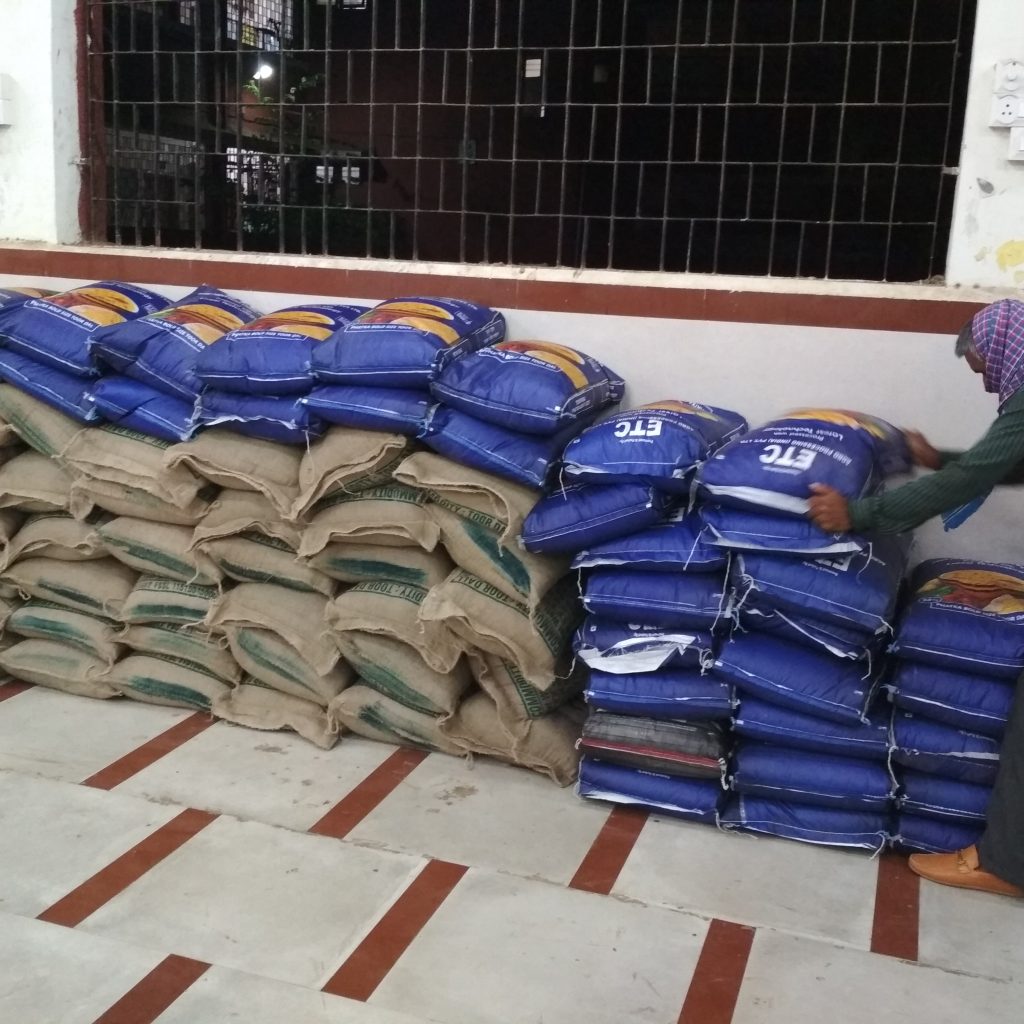
The line outside the school is now increasing and Sarla, our distribution volunteer, is finding it difficult to hide her anxiety. Outside the school, the chaos has increased, and the police van passing by has to intervene to control the situation.
The distribution process we follow is simple and straightforward. We ask each municipal school headmaster to identify the most vulnerable families of children studying in their school and put together a list of the same. These families are then notified to come to the school on a given day to pick up the ration. This list is also shared with us for identity verification before delivering the ration.
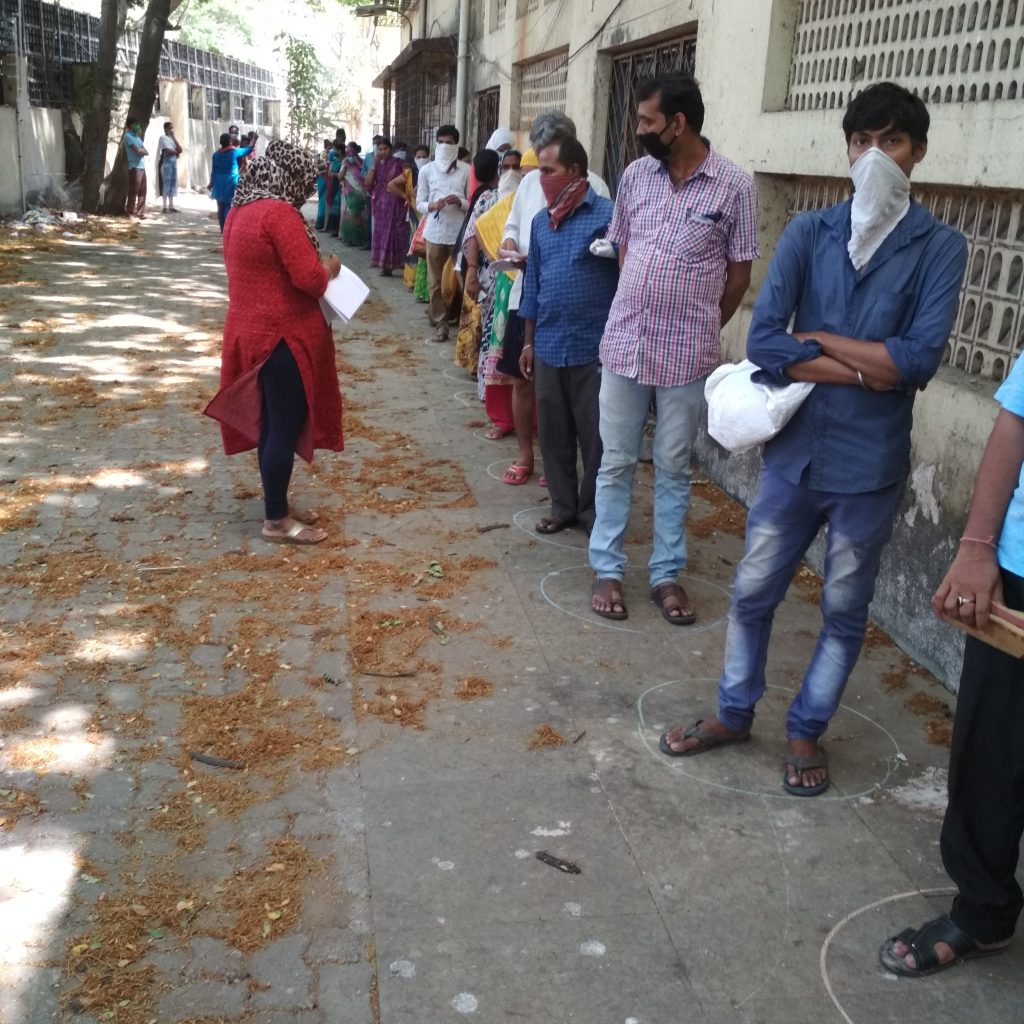
However, in many instances, things don’t go as planned. Parents whose names are not included in the list also show up, waiting under the harsh sun for hours to receive ration, hoping to be able to put some food on the table.
Another challenge is that not everyone included in the distribution list shows up at school to collect ration. We reckon that there are three key reasons associated with this challenge. One, their homes are far from the distribution center so people are reluctant to step out. Two, they may decide to step out but are stopped by the police and are punished, in many cases beaten, for flouting the lockdown rules. Lastly, many families who were not destitute before the lockdown, have to now join the growing number of people thronging the distribution centers. This has stripped many of these individuals and families of their dignity and has prevented them from receiving free ration.
Some of the families who have received the ration are now running out of cooking fuel, not widely available or offered at the ration shops. They are now wondering how to cook the ration they have received.
It is heartbreaking to hear about the condition and several grim stories of the families standing in the queue for ration. Many of them live cramped in a hot dingy 10 ft x 10 ft room, in narrow lanes with community toilets as a norm and social distancing an unachievable privilege.
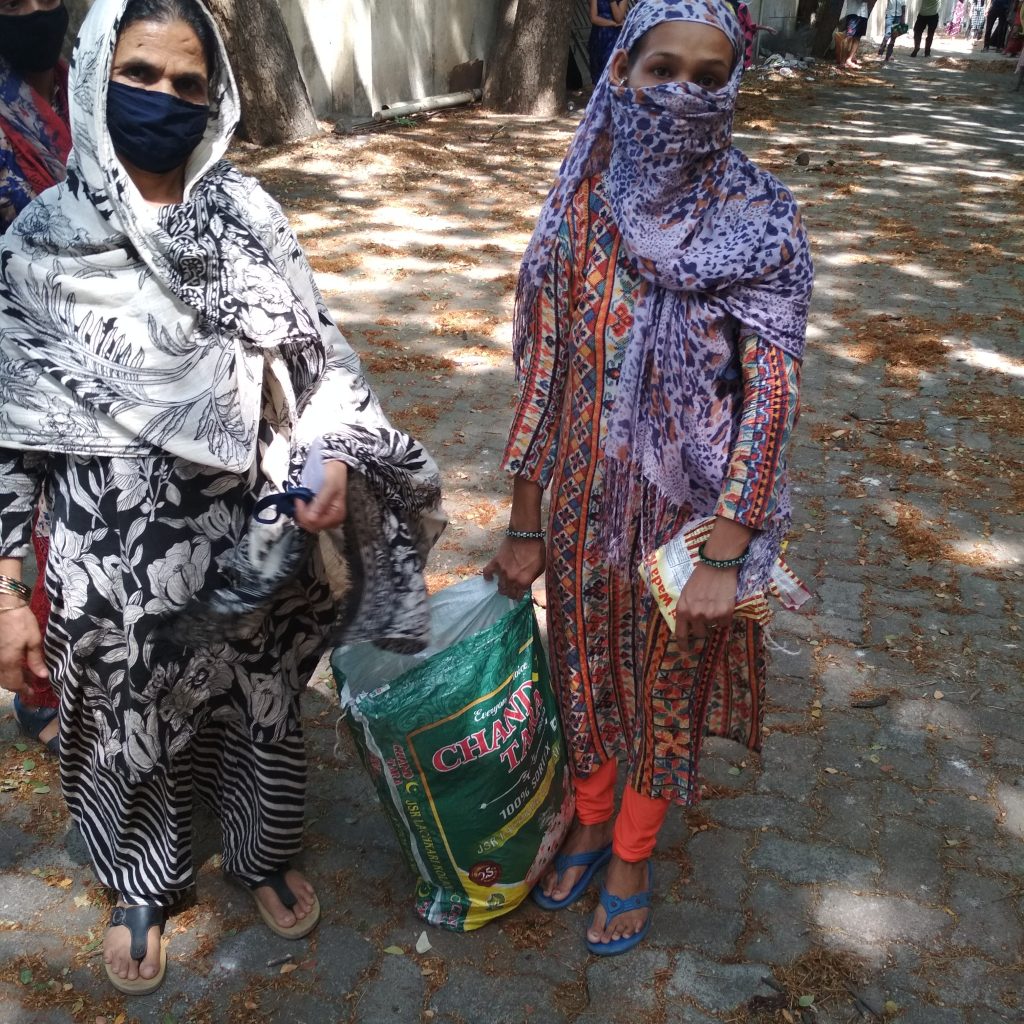
WAY FORWARD:
We at GCF, are working towards filling these gaps and attempting to eliminate the limitations of the PDS. With support from the MCGM staff, the rationing officers, and the police personnel, we have been able to identify and serve the most vulnerable families, ensure law and order while distributing ration and mobilizing local volunteers to ensure distribution done and minimizing the exposure to and from communities.
Our donors, friends, families have been the prime reason that we have been able to procure and offer over 2500 families and counting with dry ration kits up until now.
We have recently also collaborated with Akshay Patra Foundation, a non-profit organization that runs the school mid-day meal program across India. As their on-ground partners in Mumbai, GCF has been preparing ration kits donated by Akshay Patra Foundation. To date, we have helped them pack over 8000 such kits for distribution and another 4000 kits are in the pipeline.
Recently at GCF, we received a call from a lady working at a construction site in Goregaon. The team had helped her and 18 other families with ration kits in early April. She mentioned that her family is running out of ration and was worried about how she was going to feed her family moving forward.
With the extension of the lockdown and these incidents, in particular, we have realized that feeding the community isn’t going to be sustainable. We need to evaluate and explore opportunities to generate sustainable livelihoods. For example, we have started engaging homemakers in the area, and tailors for stitching face shields that serve as a source of income for them while offering protective gear to frontline staff in industries like banking and retail. In fact, one of the large public sector banks has already placed an order for these face shields to be used at one of their bank branches.
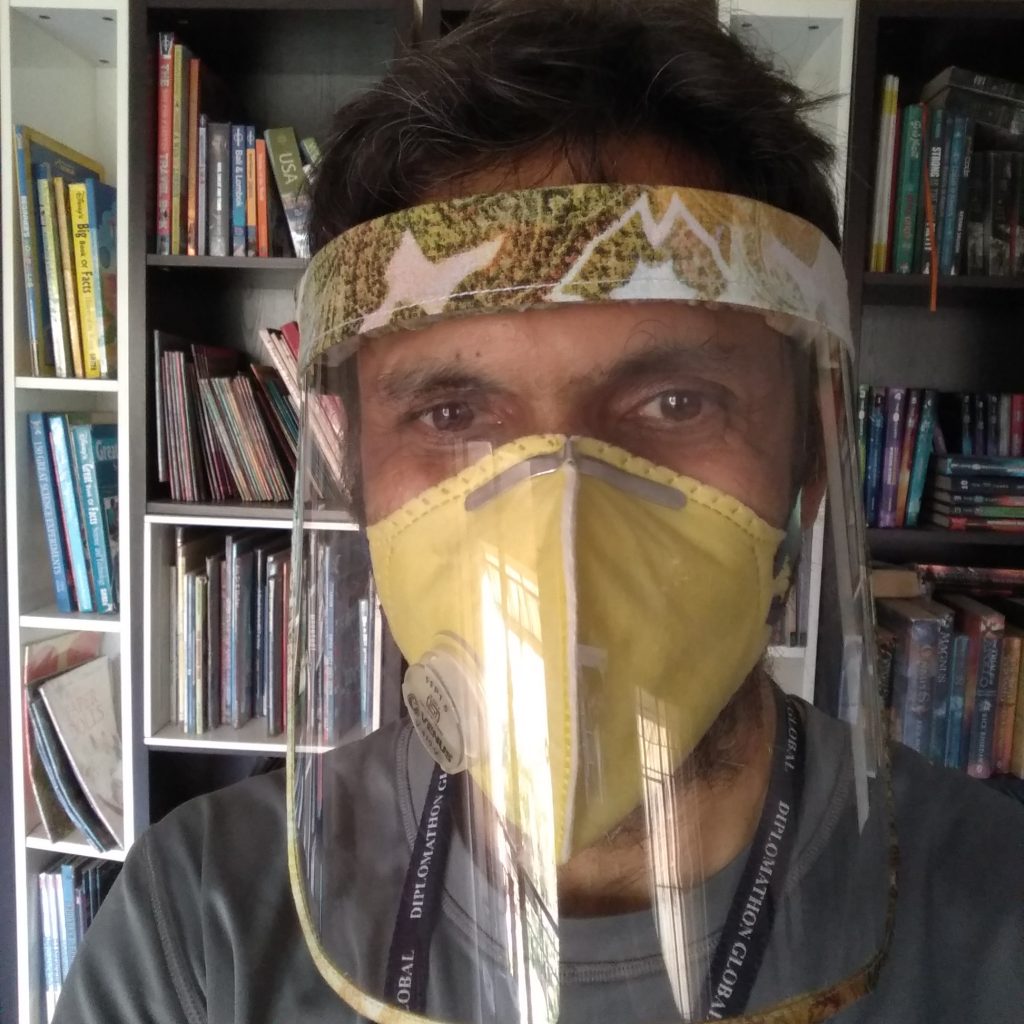
*……..*
While Covid-19 has dominated our headlines and our lives, it has also brought the community closer. Most of the stories we hear and come across are grim and hard-hitting. However, it has also started a wave of kindness and brought the communities closer. One such example among many others is of a young girl who has donated money that she earned by selling her artwork to purchase ration kits for the individuals and families in need.
As we, as a community, work towards fighting the virus, we hope we come out as more compassionate and connected with one another.
For now, we just need to support each other, especially the ones most affected by the virus and the lockdown, till they are able to get back on their own feet.
(names have been changed to protect individual identities)
To know more about how you can support this initiative, please visit:
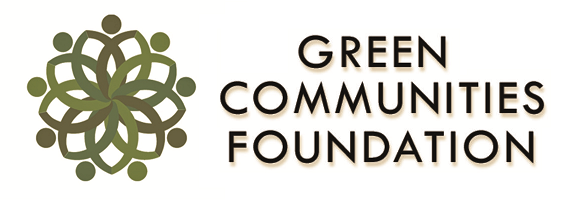

Kedar, the work you are doing is so inspiring. You and the work GCF is doing are a true embodiment of the leadership that we need today. All the best to you and GCF!